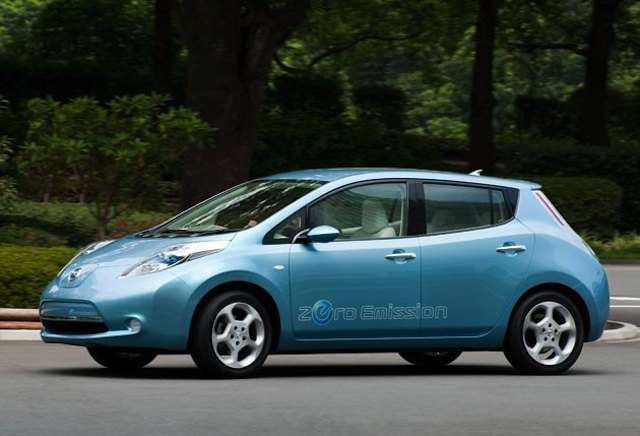Nissan Takes A Leaf Out of Detroit's Playbook
The Tennesseean (and I raise you a Kentucky) reports that Nissan’s all-EV Leaf looks set to steal a march on GM’s electric – gas hybrid Hail Mary Chevy Volt. “With the rollout of Nissan’s first electric vehicles just over a year away in Tennessee, the race is on to figure out how to set up a network of charging stations swiftly enough to get ready. It won’t be easy. Thousands of chargers will be needed to satisfy Nissan’s ambitious plans to sell thousands of the clean-running cars in the first year as it strives to be the first automaker in the world to successfully mass market an all-electric vehicle.” In other words, the Leaf is going all-in with a close-to-base roll-out strategy. “Phoenix-based ECOtality Inc. has partnered with Nissan to set up the charging systems in consumers’ homes, as well as to create public networks in Nashville, Chattanooga and Knoxville and on the interstate highways between those cities.” And who, pray tell, is paying for all this? Well duh.
Lest we forget, Nissan scored a $1.6 billion no-to-low interest, twenty-five-year loan from the Department of Energy (DOE) to build more fuel-efficient vehicles. As for ECOtality, the company’s spokesman said “We believe in traditional American values of self-reliance, accountability and independent enterprise, free from government interference. We rely on our sources of funding.” Just kidding.
ECOtality has a $100 million loan from the U.S. Energy Department to help pay for the system, which will consist of “two layers of infrastructure,” said Colin Read, the firm’s vice president for corporate development.Read said the first 1,000 buyers in Tennessee will get free home chargers installed, which could run up to about $1,500 each for the equipment and installation combined. Without that help, the biggest expense for some Leaf buyers might be getting their home garage wired for the 240-volt chargers, which themselves could cost about $500 each.
The Tennessean reckons EV owners will be able to recharge their Leaf in twenty-minutes—provided they plug-in to a fast charger. Which will cost . . . drum roll please . . . $35k each. Cost whom? In other words, is that before or after existing/the next federal or state subsidy/tax break? No se. Clearly, no one’s letting good old-fashioned number-crunching get in the way of this battery-powered steamroller.
One drawback could be figuring out how to make money from the chargers.
Local ordinances generally prohibit the resale of electricity by anyone other than a utility company, so companies that install charging equipment might be forced to think of other ways to collect from electric-vehicle drivers. One end-run might be to rent the parking space where a car recharges for 20 minutes for, say $1.75, Perry said. “That would more than cover the cost of the electricity the car would use.”
Exact revenue models are still being determined.
Your tax money kicking-back at work. Oh, did I mention that the Leaf will be built in Japan until the automaker can finish its new EV factory (built with the DOE loan)?
Meanwhile, Nissan will spend $1 billion to build a plant adjacent to its Smyrna manufacturing facility to assemble the new, high-tech lithium-ion battery packs for the Leaf. Starting in 2012, the automaker plans to begin assembling the cars in Smyrna as well. Initial capacity there will be about 150,000 vehicles a year. Until then, the cars and batteries will be built in Japan.
More by Robert Farago
Latest Car Reviews
Read moreLatest Product Reviews
Read moreRecent Comments
- Lou_BC Collective bargaining provides workers with the ability to counter a rather one-sided relationship. Let them exercise their democratic right to vote. I found it interesting that Conservative leaders were against unionization. The fear there stems from unions preferring left leaning political parties. Wouldn't a "populist" party favour unionization?
- Jrhurren I enjoyed this
- Jeff Corey, Thanks again for this series on the Eldorado.
- AZFelix If I ever buy a GM product, this will be the one.
- IBx1 Everyone in the working class (if you’re not in the obscenely wealthy capital class and you perform work for money you’re working class) should unionize.


































Comments
Join the conversation